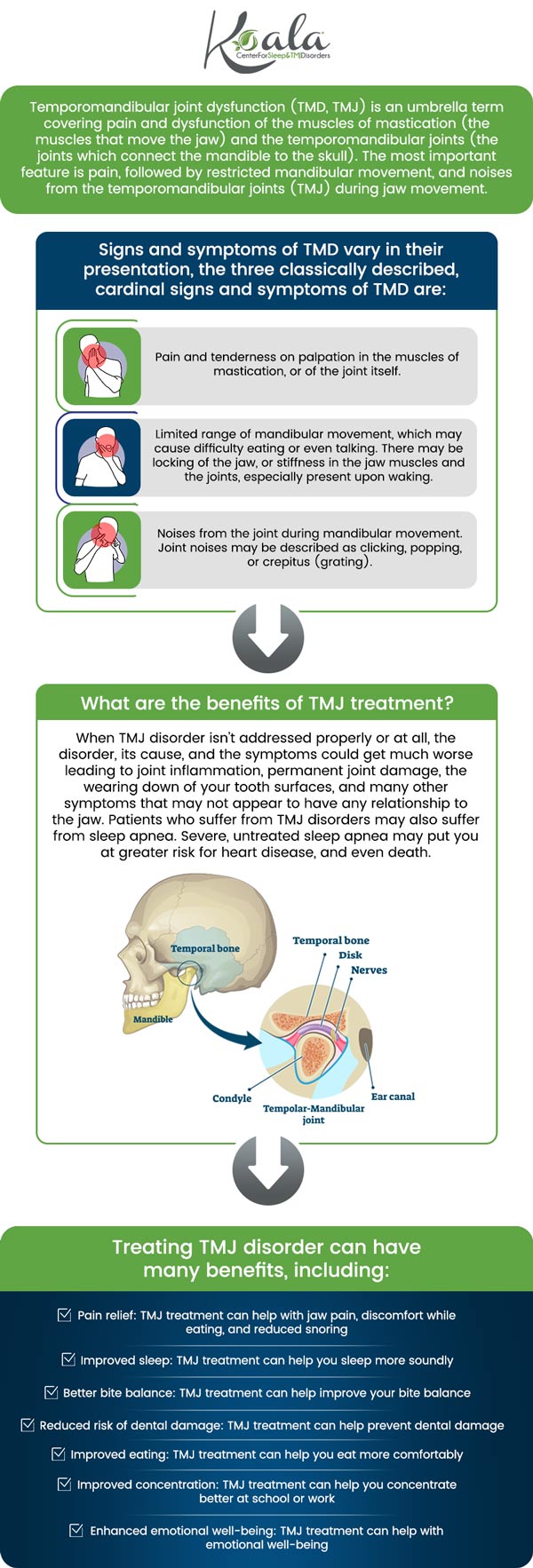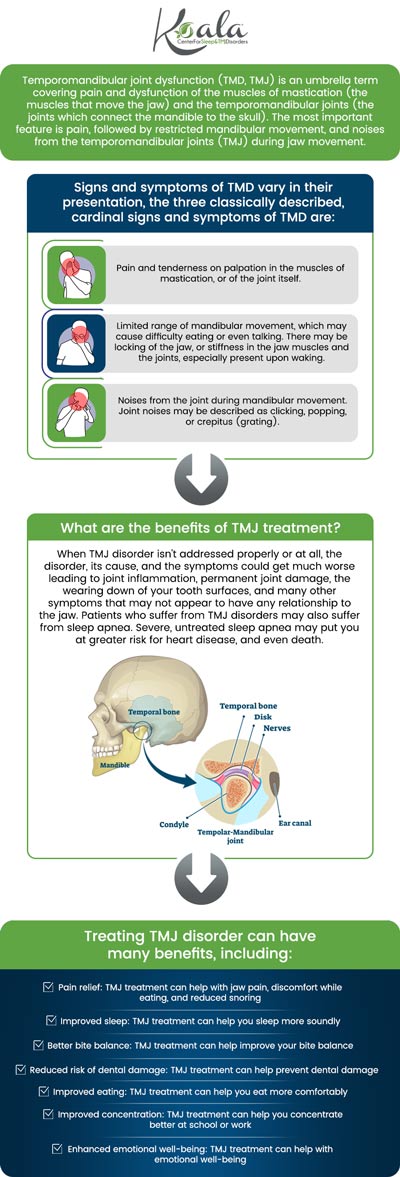How Serious Can TMJ Get?
TMJ can be serious! The good news is that treatments are available. Call our dedicated team at Koala® Center For Sleep & TMJ Disorders or visit us online to book an appointment. We have convenient locations across the U.S. in Bloomington IL, Peoria/Dunlap IL, El Paso TX and Wausau WI.




Table of Contents:
Can TMJ affect your eyes?
Does TMJ cause sinus issues?
Can TMJ affect your ears?
Can TMJ affect your brain?
TMJ, short for temporomandibular joint pain, is a condition that typically affects the jaw as it refers to the joint of the jaw. However, the pain and discomfort experienced as a result of TMJ can be far-reaching to other parts of the body that seem to have no connection to the jaw. One of the symptoms is general pain throughout the face, which can include an impact on the eyes. When TMJ affects the eyes, the symptoms can include pressure that builds behind the eye sockets.
Some people may also experience blurry vision. TMJ often causes tension headaches, which can contribute to blurry vision and pressure behind the eyes. Sufferers can also have pain around their eyes due to TMJ. If there are no diagnosed eye problems, but people experience eye issues such as constantly watering eyes, sensitivity to light, or straining, these may also be associated with TMJ.
Patients who experience TMJ disorder or sinus issues can share a lot of the same symptoms and it can often be thought that one is the result of the other. This isn’t often the case though. The two conditions share symptoms but TMJ typically does not cause issues in the sinuses. However, TMJ can potentially be the culprit in cases of chronic sinusitis that doesn’t appear to respond to treatment. In both conditions, patients can experience symptoms that include stuffiness and sinus pressure, however, TMJ disorders will include at least one other symptom that isn’t tied to sinusitis such as pain or tenderness in the jaw, pain or difficulty when chewing, the jaw making clicking, grating or popping sounds, locking of the jaw or spasms experienced in the facial muscles, and commonly the jaw muscles.
Patients experiencing symptoms related to either TMJ or sinusitis should seek care from a medical professional to get the proper diagnosis and the appropriate treatment. Particularly in patients with chronic sinus infections, a thorough exam, including imaging tests, can determine if the symptoms are TMJ or if a more aggressive treatment needs to be tried.
Since temporomandibular joint pain, or TMJ for short, affects the jaw joint, which is located in close proximity to the ears, many sufferers can experience ear pain or other conditions that affect the ears. Complications from TMJ can cause people to experience funny sounds or ringing in their ears, either with or without accompanying ear pain. Itchy ears and ears that seem to clog easily, as well as being able to hear a clicking in your jaw, can be signs of a TMJ disorder if a person hasn’t already been diagnosed as having one.
Additionally, people can experience TMJ disorder-related hearing loss which can include muffled sounds or decreased ability to hear, a feeling of fullness in the ear, and ear pain. Hearing loss severity seems to be linked to the severity of the TMJ disorder, with people suffering from more intense TMJ also having more severe cases of hearing loss, or a wider assortment of symptoms affecting the ears.
TMJ can cause a wide range of issues to different parts of the body, mostly in the head, neck, and shoulders, but also in other parts of the body that aren’t closely related to the jaw. It is important to get a proper TMJ diagnosis as the condition can affect so many different areas of the body, including the way that the brain is wired. The temporomandibular joint, where TMJ is centralized, is located in close proximity to the skull, and therefore the brain.
TMJ impacts the way the brain sends and receives signals from the rest of the body, including pain signals. It has been shown to have an impact on the body’s cognitive functions, making it harder to perform tasks, as well as neurological impacts, including leading to other disorders such as Parkinson’s disease, Tourette’s syndrome, Torticollis, balance disorders, and pain disorders. At Koala® Center For Sleep Disorders, TMJ is one of the many conditions that we treat often. Not just as it impacts our patient’s sleep cycles, but also in the way it affects their whole body.

Additional Services You May Need
▸ KoalaKIDZzz®
▸ Sleep Apnea
▸ Snoring
▸ TMJ Disorder
▸ Fatigue
▸ Sleep Disorders
▸ Weight Loss
▸ CPAP Alternative
▸ Oral Appliances




